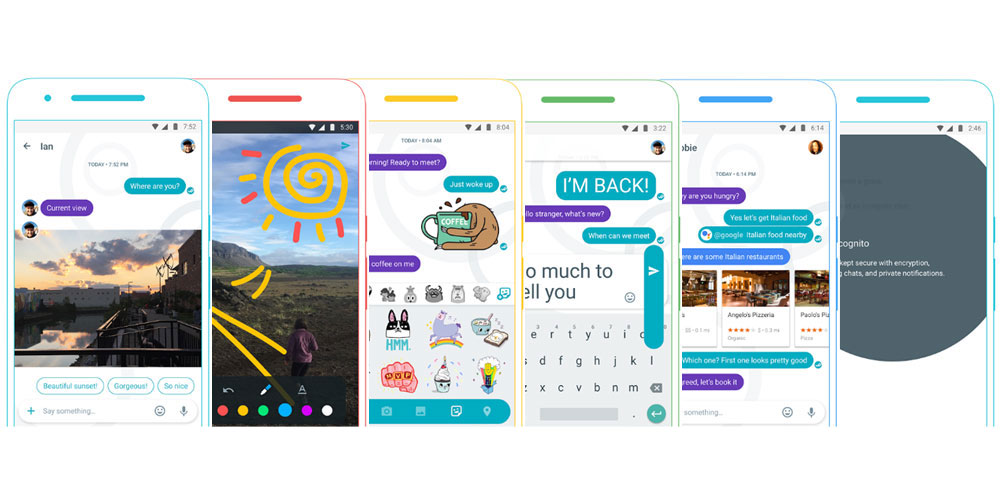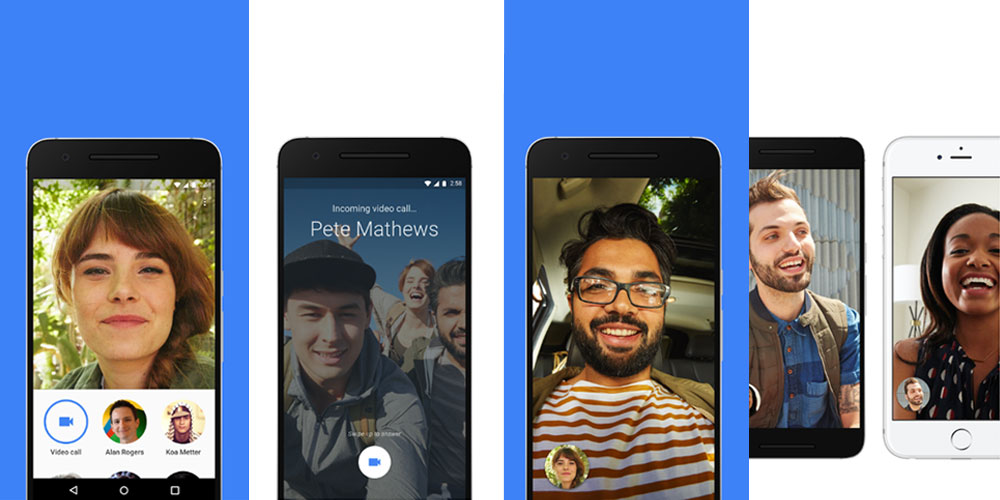Allo and Duo are two apps made by Google, meant to further complicate the messaging market. First announced at the Google I/O 2016, the two apps are competing with the likes of WhatsApp, Facebook Messenger and FaceTime.
Looking at Google's history into messaging, it was in 2013 when it unveiled Hangouts. Meant to be its debut to a true cross-platform integrated messaging app, it was the competitor to the more restricted Apple's iMessage and BBM. With easy ways to send SMS, Google Voice and others, it was a breath of fresh air.
However, Hangouts wasn't well received and this has put Google far behind the competition. Especially when Facebook's Messenger began to take good traction and WhatsApp came with good receptions, Google was hit pretty bad.
Although Google is not killing Hangouts, Allo and Duo here is like Google's attempt to put a final nail to Hangouts coffin. This time, Google sees the competition more seriously.
Allo

First of all, Allo is a messaging app which is a direct competitor to Facebook Messenger, WhatsApp and iMessage. Allo's main competing advantage is its use of machine learning. Courtesy of Google Assistant, Allo is a "smart" messaging app that can learn over time to make conversation easier and more productive.
Its Smart Replies, for example. It's a feature that can suggest things based on an asked questions, not like a stagnated quick reply option other messaging platforms have. Allo users can also make personalized answers they can use with the feature. So anything from replying an invitation for dinner or a party, Allo understands the context and can suggest a response.
From replying messages to suggesting reservation inside a conversation, Allo can do many things.
Allo also has a feature that is much like Facebook's chatbots. Here, users can talk directly with Google Assistant via text, allowing them to search for anything without ever leaving the app. To use this feature, users can type @Google in their chat window to talk directly to Assistant. And pretty much advanced, it's contextual as it remembers previous conversations so users can just carry on where they previously left off.
Allo is also fairly simple to use. Users just need to sign up with their mobile number, much like WhatsApp. And because it's a standalone app, users initially aren't required to have a Google account before using it. But a Google account can personalize the information provided by Google Assistant.
For another feature that can be highlighted, it's Expressions that are essentially emojis and stickers that can be used in chats. And the last is the Whisper Shout feature which allows users to adjust the size of a text via a slider to simulate whispering (small text) or shouting (large text). These two features can add more personality to chats.
And speaking of chats, Allo also has an incognito mode that offers end-to-end encryption and expiring chats feature for those that want more private conversations.
On September 21st, 2016, Google officially confirmed the release of Allo.
Duo

Duo is Google's standalone video calling app, meant to take on the likes of Skype and FaceTime. Dedicated for video chat, Duo features a simple user-interface inside a tiny package. But nonetheless, it is packed with many features.
First of all, Duo is fast. In fact, it's a lot faster than its video-calling competitors. This is its main highlight and Google surely made Duo to be incredibly fast in performance.
Duo has a notable feature called Knock Knock. Exclusive to Android devices, this feature allows users to see a live video of the person video calling them on the lock screen, before picking up the phone or answering them. Once the user accept to answer the call, the video starts instantly without any lag or black loading screen.
Google claims that Duo will work for users will unstable and slow cellular connections. To make this happen, Allo dynamically adjust video and audio quality on the fly to suit whatever connection users are on. Calls can also be maintained when switching from Wi-Fi to cellular and vice versa. Simply put, Google has optimized webRTC and connects the calls using QUIC over UDP. This provides faster initial connection and also end-to-end encryption.
And much like Allo, users only need their mobile number instead of their Google account.
Duo made an earlier debut in August 2016.
Conclusion

Allo and Duo are two versatile apps that can indeed be powerful contenders in the messaging industry. While the two are packed with sophistication and advances by picking up the weaknesses of competitors, Allo and Duo are seen to further crowd the already complex digital communication.
We already have too many choices. If we look deep into Google's Play Store to search for a messaging app, we are greeted with a lot too many on its list. From the popular WhatsApp to Facebook Messenger, LINE, KakaoTalk, Signal, Telegram, Snapchat and others, we're seeing a lot more than we ever need.
The choices we have: seeking messaging apps that aren't used by everyone; installing apps that not everyone will have installed; using apps that we will have trouble in finding our friends; and keeping apps that we aren't going to convince our friends to join.
In short, we're simply users inside the raging messaging war. And now we're overwhelmed.
But here is where Google is putting its bet, and this is where it fractures the market. The messaging industry is already populated with widely adopted choices. Allo and Duo are still in their infancy and the two wants to compete with more solid and mature giants. This won't be an easy task, especially when the two are still buggy.
Google is betting Allo and Duo to give a better experience than others. But if users see their initial experience with the apps to be apparently bad, in the current competitive market, users will simply forget about them and uninstall them from their devices. These people have a higher chance for not giving them a second chance even if they improve. After all, there are already too many alternative to fall back onto anyway.
But Google should have learned from its previous lessons. So aside from the number of choices we have, this time, Google is serious in the messaging business. Allo and Duo are aimed to fix the flaws of their predecessors, and to compete at the top of the messaging food chain where their older sibling apps couldn't.